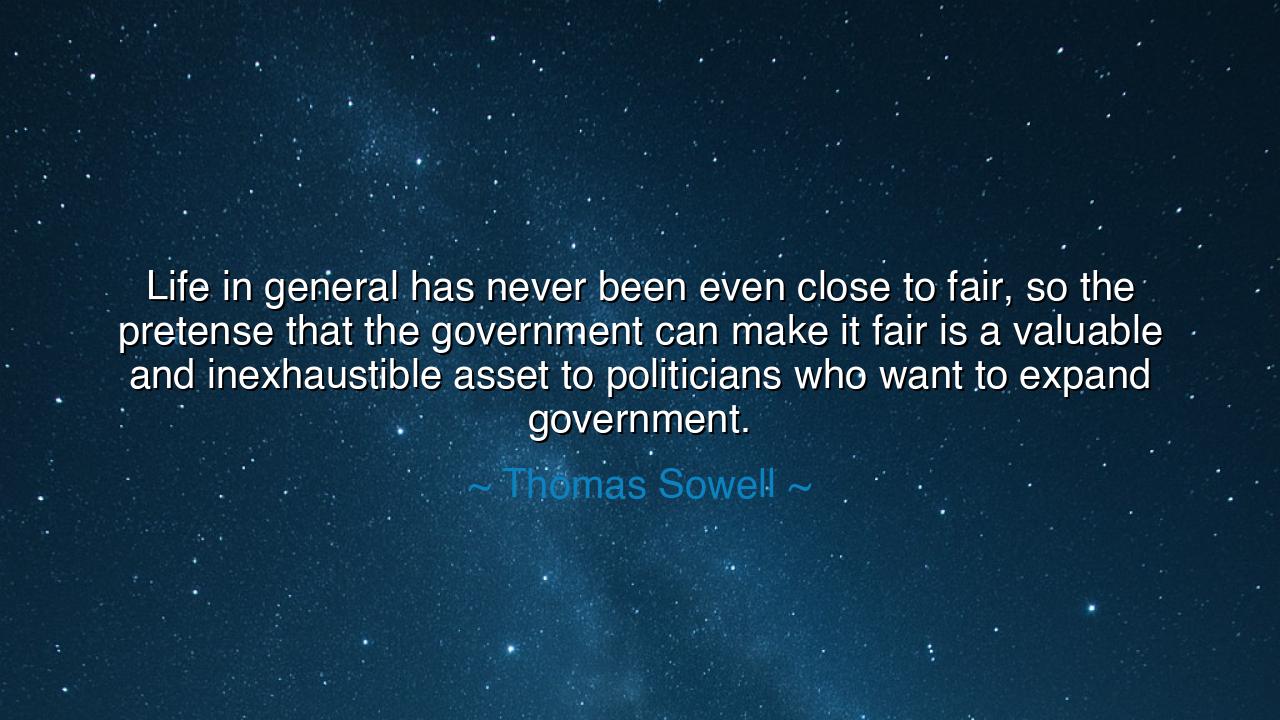
Life in general has never been even close to fair, so the
Life in general has never been even close to fair, so the pretense that the government can make it fair is a valuable and inexhaustible asset to politicians who want to expand government.






When Thomas Sowell declared, “Life in general has never been even close to fair, so the pretense that the government can make it fair is a valuable and inexhaustible asset to politicians who want to expand government,” he was not speaking in bitterness but in clarity — a clarity forged through wisdom, history, and hard experience. In these words, Sowell unmasks one of the oldest illusions in human governance: the idea that fairness can be engineered by power. He reminds us that inequality is woven into the fabric of existence — that nature itself distributes strength, intellect, fortune, and opportunity unevenly. Yet, through this inevitable imbalance, the human spirit rises not through control, but through courage, resilience, and responsibility. Sowell’s warning, though political in its surface, reaches deep into the moral soul of civilization: beware of those who promise justice through domination, for their cure may become the greater disease.
The origin of this quote lies in Sowell’s lifelong reflection on economics, human nature, and the lessons of history. A student of both hardship and liberty, Sowell rose from poverty in Harlem to become one of the most profound economists and philosophers of the modern age. His experiences taught him a timeless truth — that while injustice exists, it cannot be eradicated by decree. Governments, he argued, often exploit the yearning for fairness as a tool to consolidate control. In his view, politicians who speak most loudly of equality often seek not justice, but power, using the noble language of compassion to mask the chains of dependency. This was Sowell’s great insight: that when the state claims to equalize life, it must first assume dominion over it.
To understand his meaning, one must distinguish between justice and fairness. Justice is rooted in principle — in equality before the law, in freedom of opportunity, in respect for the individual soul. Fairness, however, is a shifting mirage, defined by emotion, perception, and envy. Governments that attempt to impose fairness inevitably end up punishing success and rewarding failure, draining society of the very excellence it needs to thrive. Sowell, echoing the wisdom of the ancients, saw this as a betrayal of nature’s truth. Life is not fair — yet it is precisely this imperfection that compels men to strive, to create, and to rise. A world made “fair” by force would be one stripped of its vitality — where greatness is stifled and mediocrity enthroned.
History bears painful witness to the danger of the pretense of fairness. In the 20th century, many nations fell under the spell of ideologies that promised equality through government control. The Soviet Union, for instance, was born from the cry of the oppressed — the dream of a classless society where all would share alike. But in its pursuit of fairness, it birthed tyranny. The state seized farms, factories, and freedoms, claiming to balance the scales of justice. Yet millions perished from famine and repression. The promise of fairness became a weapon of domination, and the politicians who wielded it found their power unchallenged, for who could question those who claimed to rule in the name of equality? Sowell’s words echo across that history: when fairness is forced, freedom is lost.
And yet, Sowell’s teaching is not a call to cynicism. He does not say that life’s unfairness should make us indifferent, but that it should make us wise. For while life is unequal in its gifts, it is equal in its opportunity for virtue. Every man and woman possesses the freedom to act with courage, to pursue excellence, to seek meaning beyond circumstance. The task of a just government is not to equalize outcomes but to protect that freedom — to create a realm where character, not coercion, determines destiny. In this way, Sowell’s quote becomes not a lament, but a celebration of liberty: true fairness is found not in control, but in opportunity.
In the modern age, his insight remains a warning against the seduction of easy promises. Even today, politicians across the world speak of creating fairness — through subsidies, quotas, and endless regulation — as if the state were a divine hand capable of leveling the human soul. But as Sowell teaches, the more government expands in the name of compassion, the more it narrows the space for individual dignity. The dream of enforced equality too often becomes a nightmare of bureaucratic arrogance, where the people’s freedom is sacrificed for the illusion of justice. The pretense of fairness becomes the tool by which power grows unchecked, feeding upon the very inequities it claims to heal.
The lesson is both moral and eternal: life will never be fair, but liberty makes it bearable — and beautiful. The wise do not demand that the world conform to their desires; they strengthen themselves to meet the world as it is. The answer to unfairness lies not in government decree, but in personal virtue — in education, hard work, compassion, and courage. Each individual who rises despite difficulty proves Sowell’s faith in the human spirit: that man was not made to be managed, but to be free.
So let this wisdom be remembered and passed down: do not entrust the dream of fairness to those who seek power. Build fairness within yourself, through integrity and effort. Accept that life gives unevenly, but know that meaning comes not from what you receive, but from what you create. For governments that promise fairness will always take freedom to deliver it — but a people who understand truth, courage, and liberty will never need to beg for fairness again.






AAdministratorAdministrator
Welcome, honored guests. Please leave a comment, we will respond soon